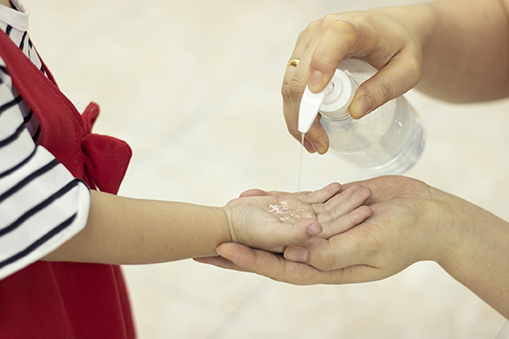
As the virus causing the COVID-19 pandemic continues to menace Connecticut, many parents are understandably worried about the health and safety of their children.
The Centers for Disease Control and Prevention (CDC) have recommendations you should follow. We offer them verbatim here:
Steps to protect children from getting sick:
- Clean hands often using soap and water or alcohol-based hand sanitizer
- Avoid people who are sick (coughing and sneezing)
- Clean and disinfect high-touch surfaces daily in household common areas (e.g. tables, hard-backed chairs, doorknobs, light switches, remotes, handles, desks, toilets, sinks)
- Launder items including washable plush toys as appropriate in accordance with the manufacturer’s instructions. If possible, launder items using the warmest appropriate water setting for the items and dry items completely. Dirty laundry from an ill person can be washed with other people’s items.
Children may present with mild symptoms:
The symptoms of COVID-19 are similar in children and adults. However, children with confirmed COVID-19 have generally presented with mild symptoms. Reported symptoms in children include cold-like symptoms, such as fever, runny nose, and cough. Vomiting and diarrhea have also been reported. It’s not known yet whether some children may be at higher risk for severe illness, for example, children with underlying medical conditions and special healthcare needs. It is worth noting that the CDC is investigating cases of multisystem inflammatory syndrome in children (MIS-C) associated with COVID-19.
Multisystem inflammatory syndrome in children (MIS-C) is a condition where different body parts can become inflamed, including the heart, lungs, kidneys, brain, skin, eyes, or gastrointestinal organs.
Children need to wear facemasks:
Children 2 years and older should wear a mask over their nose and mouth when in public settings where it’s difficult to practice social distancing. This is an additional public health measure people should take to reduce the spread of COVID-19 in addition to (not instead of) the other everyday preventive actions listed above.
Children and their friends:
Limit Social Interactions Where Possible: The key to slowing the spread of COVID-19 is to limit contact as much as possible. While school is out, children should not have playdates with children from other households. If children are playing outside their own homes, it is essential that they remain 6 feet from anyone who is not in their own household.
When schools reopen: As you are making decisions about your child(ren) returning to school, it is important to consider the full spectrum of risks involved in both in-person and virtual learning options. Parents, guardians, and caregivers should weigh the relative health risks of COVID-19 transmission from in-personal instruction against the educational, social-behavioral, and emotional risks of providing no in-person instruction when deciding between these two options.
Here is a very good questionnaire on the CDC website designed to help parents make good decisions about the choices here. It can be found at https://www.cdc.gov/coronavirus/2019-ncov/community/schools-childcare/decision-tool.html
Practice Social Distancing: Avoid large and small gatherings in private places and public spaces, such a friend’s house, parks, restaurants, shops, or any other place. This advice applies to people of any age, including teens and younger adults.
Clean Hands Often: Make sure children practice everyday preventive behaviors, such as washing their hands often with soap and water for at least 20 seconds. This is especially important if you have been in a public place.
Remember, if children meet outside of school in bigger groups, it can put everyone at risk.
Information about COVID-19 in children is somewhat limited, but current data suggest children with COVID-19 may only have mild symptoms. However, they can still pass this virus onto others who may be at higher risk, including older adults and people who have serious underlying medical conditions.
Watch your child for any signs of illness.
- If you see any sign of illness consistent with symptoms of COVID-19, particularly fever, cough, or shortness of breath, call your healthcare provider and keep your child at home and away from others as much as possible. Follow CDC’s guidance on “What to do if you are sick.”
Watch for signs of stress in your child.
- Some common changes to watch for include excessive worry or sadness, unhealthy eating or sleeping habits, and difficulty with attention and concentration. For more information, see the “For Parents” section on CDC’s website, Manage Anxiety and Stress.
- Take time to talk with your child or teen about the COVID-19 outbreak. Answer questions and share facts about COVID-19 in a way that your child or teen can understand.
- Go to CDC’s Helping Children Cope with Emergencies or Talking with Children About COVID-19 for more information.
Teach and reinforce everyday preventive actions.
- Parents and caretakers play an important role in teaching children to wash their hands. Explain that handwashing can keep them healthy and stop the virus from spreading to others.
- Be a good role model—if you wash your hands often, they’re more likely to do the same.
- Make handwashing fun and a family activity.
Help your child stay active.
- Encourage your child to play outdoors—it’s great for physical and mental health. Take a walk with your child or go on a bike ride.
- Use indoor activity breaks (e.g., stretch breaks, dance breaks) throughout the day to help your child stay healthy and focused.
Help your child stay socially connected.
- Reach out to friends and family via phone or video chats.
- Write cards or letters to family members they may not be able to visit.
- Some schools and non-profits, such as the Collaborative for Academic, Social, and Emotional Learning and The Yale Center for Emotional Intelligence, have resources for social and emotional learning. Check to see if your school has tips and guidelines to help support the social and emotional needs of your child.
Limit time with older adults, relatives, and people with serious underlying medical conditions
Older adults and people who have serious underlying medical conditions are at the highest risk of getting sick from COVID-19.
- If others in your home are at particularly high risk for severe illness from COVID-19, consider extra precautions to separate your child from those people.
- If you are unable to stay home with your child during school dismissals, carefully consider who might be best positioned to provide child care. If someone at higher risk for COVID-19 will be providing care (older adult, such as a grandparent or someone with a chronic medical condition), limit your children’s contact with other people.
- Consider postponing visits or trip to see older family members and grandparents. Connect virtually or by writing letters and sending via mail.
All of at RisCassi & Davis urge you to follow these important guidelines from CDC so that you and your children are protected.
